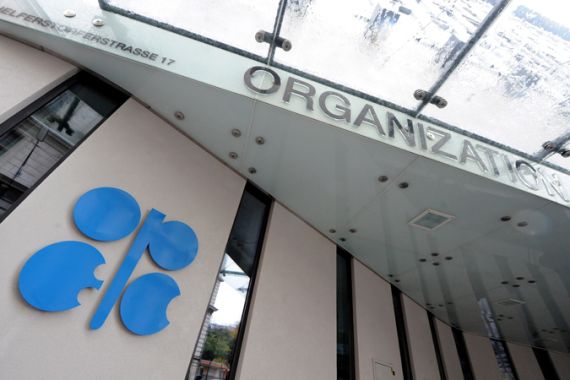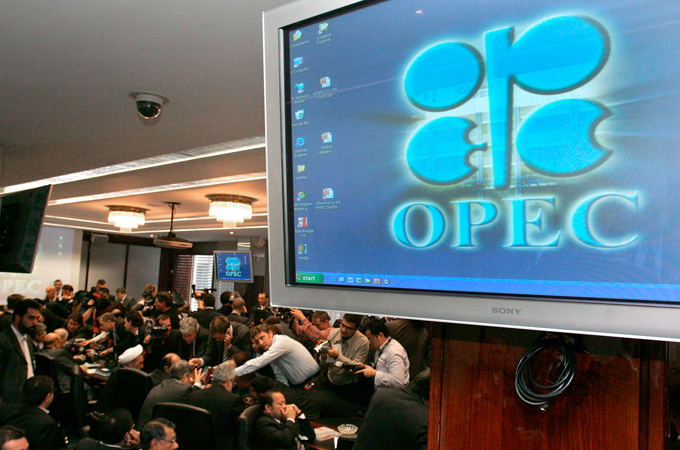Opec turns 50
Opec, the giant oil bloc, is marking its 50th anniversary amid continuing speculation over its impact on oil markets.

 |
| Opec members have been urged to find alternative forms of energy [EPA] |
Fifty years into its existence, the Organisation of the Petroleum Exporting Countries (Opec), the Vienna-based oil bloc, continues to dominate the global oil market.
Its omnipresence is more acutely felt in the crude oil business.
Keep reading
list of 4 items‘We need you’: Solomon Islands’ support for US agency’s return revealed
Why are nations racing to buy weapons?
Parallel economy: How Russia is defying the West’s boycott
Politically, however, the organisation is not as potent a force as it could be. Its dozen members are often incohesive in their actions, sometimes pursuing contradicting political agendas.
The organisation, which is 50 years old today, was founded in Baghdad, Iraq on September 14, 1960.
The founding members were Iraq, Iran, Kuwait, Saudi Arabia and Venezuela, with the five oil producing nations seeking to control their crude output in a bid to increase prices and hence their revenues.
Today, Opec has 12 members: Saudi Arabia, Iran, Iraq, Kuwait, Venezuela, United Arab Emirates, Algeria, Nigeria, Ecuador, Angola, Libya and Qatar.
Indonesia joined in 1962 and withdrew in 2008 for not developing enough wells, and Gabon joined in 1975 and withdrew in 1996.
Opec members produce about 40 per cent of the world’s oil. The group meanwhile possesses about 60 per cent of the world’s proven crude oil reserves.
Alternative energy
Despite half a century of continuous oil exporting revenues, Opec members are still heavily dependent on oil exports as a source of revenue, an issue that prompted Abdalla El-Badri, the organisation’s secretary general, to urge member states to seek alternative forms of energy.
“Oil is a finite product,” he told the German Press Agency dpa. “I think we need, after 50 years, to find another source of income.
“I am not saying they should abandon oil, but they should use oil to find another source of income, be it from industry, tourism or alternative energies.”
Opec refuses to be classified as a cartel. The organisation says it was formed to draw a line to Western oil firms, which had been taking all the profit from oil producing operations, and that the countries where oil was pumped wanted a bigger say.
“Opec was created because they [member states] were getting nothing from their resources,” El-Badri said.
The issue of whether the 50-year-old organisation is still solid and enjoys a grip on the market is highly controversial among analysts.
However, Opec remains a key influence on oil markets, with non-Opec output set to fall and consumers burning fossil fuels despite higher demand for renewable energy.
Opec powerless?
Some experts say that Opec has lost a lot of its power to shape prices directly by raising or throttling supply since the oil shocks of the 1970s, but that markets still react to its announcements.
Ahmed Zaki Yamani, the former Saudi oil and mineral resources minister, and one of the most notable figures in the world of oil markets, believes that Opec lost much of its power after the Arab-Israeli war in 1973.
“The plan of using oil as weapon failed … we did not wait enough to reap what we sowed, and the result was Opec loosing its power,” Yamani told Al Jazeera.
However, other observers believe the organisation is still influential on its silver jubilee.
Above the demographic and political differences separating members such as Algeria, Iran, Nigeria and Venezuela is “a common bond sealing the organisation together – the countries’ dependence on revenue from oil,” said analyst Francis Perrin, from the publication Petrole et Gaz Arabes.
Opec showed off its political might during the 1970s, when it significantly slashed output following the Arab-Israeli conflict and Iranian Revolution. The global oil price soared as a result.
External competition
But stiffer competition surfaced a decade later as non-Opec oil producers came to the fore, thanks to ramped-up production in the North Sea.
In more recent times, Russia has become an increasingly important producer, able to compete with the likes of Norway and Opec members such as Nigeria and Qatar.
Recently, however, Nobuo Tanaka, the head of the International Energy Agency, said that global dependency on Opec for crude oil would in fact rise in the next five-to-10 years as output by non-Opec countries falls.
All oil producers meanwhile face the risk of greater demand for cleaner and renewable biofuels amid climate change fears and recent spikes in the price of crude oil.
Shaking off the threat, producers and consumers agreed at the International Energy Forum in April that fossil fuels would provide the bulk of the world’s energy needs for “decades” to come.
Barclay’s Capital analyst Paul Horsnell agreed that talk of Opec’s demise was “somewhat premature”.
“There is still, in our view, something of an anti-Opec slant in much coverage, with analysis tending to rush to write-off Opec’s relevance, understate the cohesion of its aims, and to play down its effectiveness as an influence.
“Indeed, throughout the latest economic cycle, it is very difficult to make the case that Opec has not been effective in defending prices,” he added.
Steady market
World oil prices have traded between $70 and $80 a barrel (159 litres) for a number of months – a range which Opec members have deemed adequate.
However, two years ago the market was vastly different in the run-up to and during the financial crisis.
Geopolitical tensions sent crude futures spiking to record highs above $147 a barrel, before the economic crisis sent them tumbling to just $33.
The slump in prices saw Opec members cut their output quotas by about 20 per cent – an unprecedented amount in the group’s history.
El-Badri called for trading of future contracts of oil to be regulated to some extent, to avoid another price spike like the the one of summer 2008, when crude hit $147 dollars per barrel.
Looking ahead, Opec could well see a spike in its production as Iraq seeks to lift output to 12 million barrels a day within six years, up from 2.5 million at present as the country recovers after years of conflict.
That would catapult Iraq to the second largest oil producer in Opec behind Saudi Arabia.
“It is a major challenge,” said Jean-Marie Chevalier, an energy market expert at the Dauphine University in Paris, who added that the goal relies on large-scale foreign investment materialising.